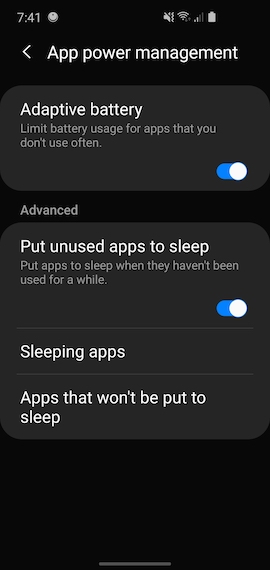I've owned (and currently own) Samsung devices, so I know a little as to how it works from the user's point of view. The technical specifications and how it works on the inside is an entirely separate issue, and one I can't answer.
The system can detect if you open an app. Samsung uses that in their app optimization, and will save power on apps that haven't been used in over three days. It is a terrible system though.
It ignores background-processes that may be critical to apps, and even if it is an app you actively use, like a fitness tracker, it will have issues. To quote what it says inside the app optimization-list:
"To save battery power, apps that haven't been used for more than 3 days will be designated to save power. Apps designated to save power may not show notifications"
(Rough translation from Norwegian, originally taken from an S6 running Android 6)
Therefore, apps that have been manually, or automatically set (3 days of no use) may give various issues with background processes. But remember that the user can set any app to never save battery, and ignoring the automatic setting. So with this in mind, let's consider possible solutions.
There is one scenario where you do not need to worry about the app and app optimization: When app optimization is disabled entirely.
Looking aside that, there is really only two things you can do:
Ask users on Samsung to disable battery optimization for your app to prevent issues
As @MinaSamy suggested (in their now deleted answer), SyncAdapter and having a periodic synchronization. Note that I haven't tested this, so I don't know whether it works or not.
And there's also a third option, which really isn't a solution, but you can ignore it and gamble on app optimization being disabled, or just not care about it at all.
Does anyone have insight in what Samsung considers to be "used" and can I somehow trigger that?
As far as I know, unless Samsung added some safeguards against accidental opening or added some kind of minimum activity requirement, opening is enough. It appears to be a "stupid" feature, which runs on hard-coded rules rather than a dynamic system that actually detects app use and sets power saving relative to that. It's "easy to enable", but fortunately easy to disable as well.
Meaning you cannot trigger an event that will keep it alive (unless SyncAdapter does the trick)
And to make the facts clear, from @Neil's answer:
It does seem like the user can do this, so there must be some database or setting somewhere that controls it.
There kinda is. There are a total of four settings, three of which are app-specific, and it is stored in a database (or some other form of data storage). These four settings can be used, although extremely shallow, to alter the behavior of the app optimization:
- Always optimize
- Automatic optimization
- Never optimize
- Disable app optimization
The first three options are on a per-app basis, which means each app can have separate settings. Disabling app optimization is exactly what you'd expect: it disables the entire feature for all apps. If it's disabled entirely, nothing is optimized.
There's also a website listing ways of bypassing optimizations on a per-brand basis. The entry for Samsung is more or less what I've said: tell the user to manually disable optimization. There are no developer solutions.

